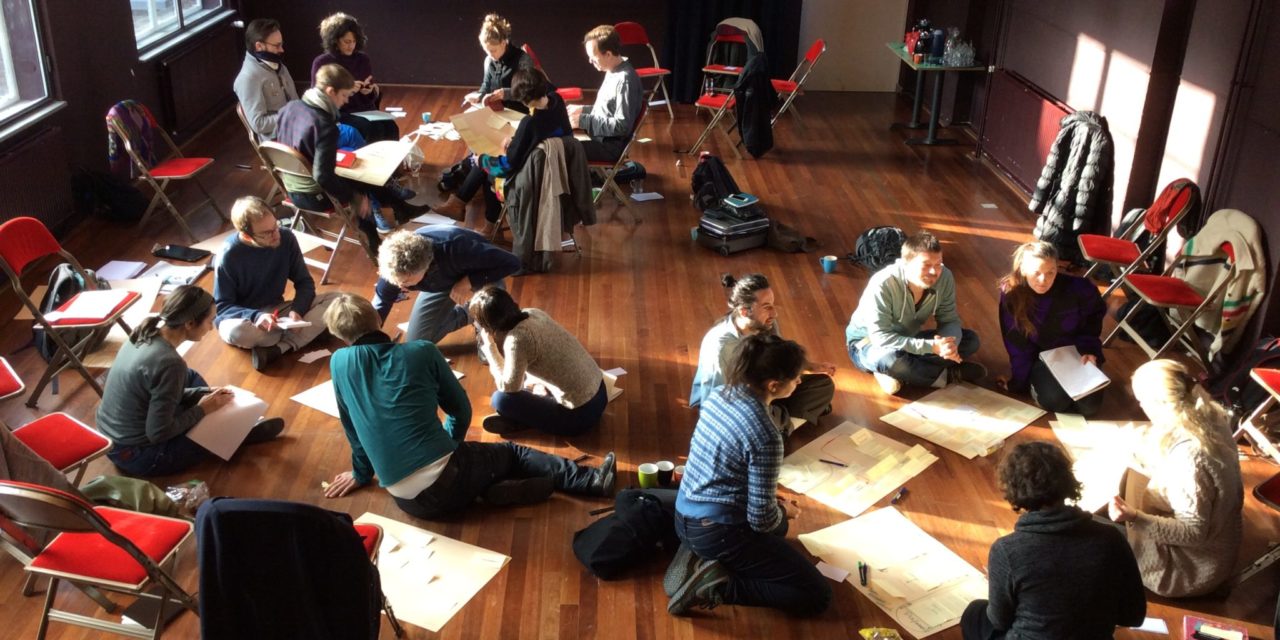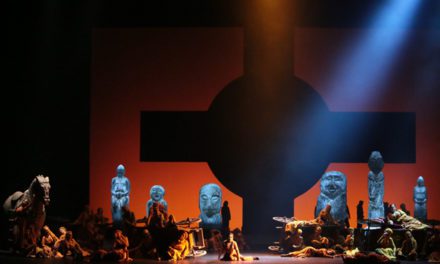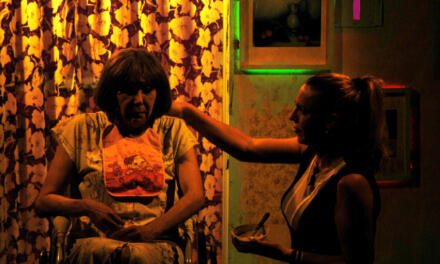For three years, between 2013-2016, we regularly invited theatre-makers, choreographers, performers, dramaturgs and performance theorists to take part in a series of research encounters that aimed to examine dramaturgical practice from several perspectives. These encounters took place in a variety of institutional frames for dance, theatre, and performance (university departments, research and residency centres, production houses, independent academies and a squatted theatre) and throughout different parts of Europe, in Belgium, the Netherlands, Great Britain, Croatia, Greece, and Spain.
In a series of two- or three-day workshops followed by public roundtable discussions, dramaturgical practice was explored in different ways, including the following: identifying dramaturgical tendencies (formal, aesthetic, structural) in contemporary performance; developing concepts and methodologies for performance-making; examining feedback, critical and creative response as dramaturgical activities; pursuing dramaturgy as the creation of actions in artistic work; and devising working frames in dramaturgical processes with an awareness of their relation to institutional critique and their potential for producing social imaginings. For each workshop, we prepared and facilitated anew different set-ups that would allow the participants and ourselves to delve into a practising of dramaturgy from the proposed perspective. Under the initial project title ‘Dramaturgy at Work’ (https://dramaturgyatwork.wordpress.com), we thus worked with artists and scholars from all over Europe addressing questions related to the role and function of dramaturgy today.
The departure point for our dramaturgical explorations has been our discontent with certain usages and interpretations of dramaturgy that we have noted recurring in relevant bibliography, such as the major focus on ‘the dramaturg’ rather than dramaturgy, and the interpretation of dramaturgy either as a process of performance analysis or as a practice of coherence-making, with the major aim of success. With the book publication The Practice of Dramaturgy: Working on Actions in Performance (Valiz, 2016), we thus wish to approach dramaturgy in three interconnected ways:
- without a dramaturg: as a practice that does not necessarily coincide with the job of one person but constitutes a shared activity among the different agents involved in a work’s process of making, including the dramaturg (whenever there is one);
- as a singular term and without an accompanying adjective: as a practice that responds to the heterogeneity and diversity of contemporary artistic production while remaining singular, non-relativized and common to all artistic work regardless of whether this is more or less ‘new’ or ‘old’, more or less ‘traditional’ or ‘passé’, ‘contemporary’, ‘open’ or ‘experimental’ etc.;
- not only as performance analysis or a controlling process of cohesion-making aiming at a work’s ‘success’, but as a practice that is situated in the process of making and has the potential to move a work ‘forward’ in interventionist ways that might often confuse, disorientate, or alienate it.
Departing from such understandings, we suggest an alternative understanding and practice of dramaturgy drawing on the etymology of the term, which derives from δράμα (drama= action) and έργον (ergon=work), and denotes primarily the working on actions that takes place in the frame of artistic production. In this way, we seek to defend as well the urgent demand to reassess dramaturgy as a mode of thinking and doing (together) that is not concerned with specific meanings, aesthetics or styles of a performance. Rather, it can be understood as a catalytic operation within artistic processes that produces (re)actions, which in turn open up and move a work forward without necessarily controlling it.
Three principles that emerged during the workshops inform our proposal for dramaturgy as we perceive its relevance today: mobilising questions, alienating, commoning. Without aiming to offer ‘efficient’ tools that can be applied to every project regardless of its specific needs, we propose these principles as working modes that can function in different ways. They are dependent upon the particularities of each work, but in overall allude to dramaturgy as a catalytic operation that produces what we describe as a process of ‘working on actions’ in artistic production. More precisely:
- mobilizing questions: instead of asking ‘correct’ questions that look for ‘effective’ answers, and therefore going beyond an understanding of dramaturgy as the mere formulation and asking of questions that are meant to lead to an ‘optimisation’ of the work, we are interested in dramaturgy as a process that works with questions as its actual material and in this way triggers their very mobilization as a shared process of thinking amongst collaborators but also potentially extending to audiences of a work.
- alienating: given the fact that an artwork cannot be conceived merely as the summation of the efforts of those involved in it, but always exceeds their scope, having its own force and modes of operating, we are interested in how one can move towards the work that is to come less through ‘knowing’ or ‘authoring’ it and more through processes of alienation and estrangement; less through prioritizing, evaluating, or announcing the relevance of specific aspects in the work, and more through becoming attentive towards the diversity of the elements present in it, which could be described as a process of alienating one’s self from what it is that one is doing, in order to rediscover it anew each time.
- commoning: conceiving dramaturgy as a practice that puts the idea of plurality ‘at work’, we seek working modes that create a space of un-belonging and disowning, and strive for a pluralized and differential process of communicating, working, imagining, and experimenting that makes possible the search and production of commons (in the sense of practices, imaginings, and actions), without producing isomorphism of projects and ideas.
In The Practice of Dramaturgy we thus propose these three principles as catalysts for dramaturgy, offering an understanding of dramaturgical practice as a catalytic operation, which sets the work ‘in motion’. Dramaturgical practice can namely transform and develop artistic processes without necessarily controlling them. The question of how one can create concrete working frames and conditions that will, nevertheless, not point to predetermined results and outcomes, has therefore been, and remains, at the centre of our attention. Through this lens, we can consider the dramaturgical operations generated through the principles of mobilizing questions, alienating and commoning, as setting forth but not necessarily pre-setting a sequence of experiments, leading thereby to artistic processes of constant re-initiation, beyond predictions and pre-calculated results.
In this sense, and if the practice of dramaturgy is often associated with aspects of coherence and success in performance, the three principles we have proposed may attribute to dramaturgy a sense of efficiency, but interpreted as a negative one. We consider it crucial to remain sceptical against neoliberal concepts that are nowadays determining most aspects of work and life, such as ‘efficiency’, ‘creativity’, or ‘usefulness’; we therefore, suggest a practice of dramaturgy that is expected to conceive, create, and catalyse actions that can be efficient, but in ways that question, intervene, or undermine habitual logic and the current state of affairs. Devising and applying strategies, tactics, and tools is hence crucial. However, we also maintain that artistic production needs to preserve its capacity for abstraction and poetics in ways that may not be manageable for the logic of the capital. We would thus argue that the principles of mobilizing questions, alienating, and commoning perform a dual operation, of concreteness and instability, of working and unworking, which is key in our approach, conceptualization, and suggested a practice of dramaturgy. In this way, dramaturgy is revealed as an (un)working process operating on the basis of catalytic principles, so that it cannot be subordinated to an end, in the same way that it cannot be understood outside of its own materiality.
This text is a reworked and condensed version of the Introduction and Part I of The Practice of Dramaturgy: Working on Actions in Performance (Valiz, 2016) that have been written by the three authors.
This post was written by the author in their personal capacity.The opinions expressed in this article are the author’s own and do not reflect the view of The Theatre Times, their staff or collaborators.
This post was written by Konstantina Georgelou, Efrosini Protopapa, and Danae Theodoridou.
The views expressed here belong to the author and do not necessarily reflect our views and opinions.


















